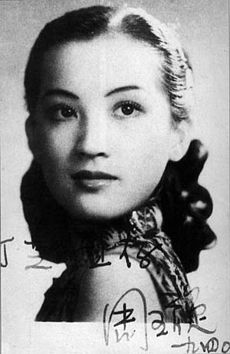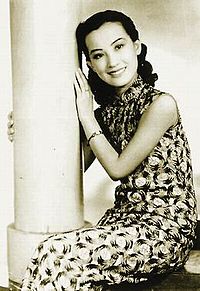- Zhou Xuan
-
Zhou Xuan 
Chinese name 周璇 Pinyin Zhōu Xuán (Mandarin) Birth name Su Pu (蘇璞) Origin China Born August 1, 1918 or 1920
Changzhou, Jiangsu, Republic of ChinaDied September 22, 1957
Shanghai, ChinaOccupation Singer, Actress Genre(s) Shidaiqu, Mandopop Instrument(s) Singing Years active 1935-1953 Zhou Xuan (August 1, 1918 or 1920 – September 22, 1957) was a popular Chinese singer and film actress. By the 1940s, she had become one of China's seven great singing stars.[1] She is probably the most well-known of the seven, as she had a concurrent movie career until 1953.
Contents
Biography
Zhou was born Su Pu (蘇璞), but was separated from her natural parents at a young age and raised by adoptive parents. She spent her entire life searching for her biological parents but her parentage was never established until after her death.[2]
According to later family research, a relative who was an opium addict took her at the age of 3 to another city and sold her to a family named Wang, who named her Wang Xiaohong. She was later adopted by a family named Zhou, changing her name to Zhou Xiaohong.[3]
At the age of 13 she took Zhou Xuan as her stage name, 'Xuan' (璇) meaning beautiful jade in Chinese.
Career
In 1932, Zhou began acting as a member of the Bright Moonlight Song and Dance Troupe. She later achieved stardom in 1937 in Street Angel (馬路天使), when director Yuan Muzhi cast her as one of the leads as a singing girl.
The "Golden Voice" (金嗓子) was Zhou's nickname to commend her singing talents after a singing competition in Shanghai, where she came in second.[1] Zhou rapidly became the most famous and marketable popular singer in the gramophone era up to her death, singing many famous tunes from her own movies. Her light but eminently musical voice captured the hearts of millions of Chinese of her time.
Between 1946 and 1950, she often went to Hong Kong to make films such as "All-Consuming Love" (長相思), "Hua wai liu ying" (花外流鶯), "Qinggong mishi" (清宮秘史), and "Rainbow Song" (彩虹曲). After introducing "Shanghai Nights" (夜上海) in 1949, Zhou returned to Shanghai. She spent the next few years in and out of mental institutions owing to frequent breakdowns. Through the years, Zhou led a complicated and unhappy life marked by her failed marriages, illegitimate children, and suicide attempts.
Having made a total of 43 movies, her favourite film was always Street Angel. This contained two theme songs: "Four Seasons Song" (四季歌) and "The Wandering Songstress" (天涯歌女), which enjoyed long-lasting popularity.[3]
Death
In 1957 she died in Shanghai in a mental asylum at the age of 39 during the Anti-Rightist Movement.[4] A possible cause of death may be encephalitis following a nervous breakdown.
Zhou Xuan was survived by 2 sons, Zhou Wen[5] and Zhou Wei, born of different fathers. According to Zhou Wen's biography, the younger son, Zhou Wei, was the son of Tang Di (唐棣), while the father of Zhou Wen is unknown.
Zhou Wei currently lives in Toronto performing at times in the TTC subways, and participating in various musical projects, including teaching. He is known as a flautist.[6][7] He has two daughters, both musicians. The elder of the two, Zhou Xiaoxuan, is a classical pianist trained at Concordia University[disambiguation needed
 ] and now living in Beijing.
] and now living in Beijing.Adaptations
To this day, Zhou Xuan's songs still remain a staple in many Golden Oldies collections in Mandarin popular music.
There have been 2 biographies written by Zhou Xuan's surviving family members. The book My Mother Zhou Xuan (我的媽媽周璇) was written by Zhou Wei and his wife Chang Jing (常晶); while a later book, Zhou Xuan Diary (周璇日記), was written by Zhou Wen.
Biography controversy
After Zhou Wen's biography was published, Zhou Wei accused Zhou Wen for altering Zhou Xuan's diary and copying the contents in an attempt to mislead readers into distorting the image of Zhou Xuan. The rebuttal also revealed that Zhou Wen had hated Zhou Wei since youth. Zhou Wen was sent for adoption after birth, followed by alleged dark influences. Zhou Wei then legally inherited Zhou Xuan's wealth over Zhou Wen.[8]
Television
An adaptation of the life of Zhou Xuan was TVB's Song Bird in 1989, starring Nadia Chan as Zhou Xuan and Leon Lai as her lover. In this series, Xuan's songs were re-written in Cantonese and sung by Chan. She sang the duets with Lai in the program while under the limits of Crown Records (娛樂唱片). Deric Wan replaced Lai's vocals on the soundtrack album.[citation needed]
Another adaptation, based on Zhou Wei's biography, is the Chinese serial titled Zhou Xuan (周璇), starring Cecilia Cheung. This version of the story was accused by Zhou Wei as a false representation of Zhou Xuan and damaging to the reputation of the Zhou family.[9]
Filmography
- 狂歡之夜 (1935)
- Street Angel (馬路天使, 1937)
- 西廂記 (1940)
- 孟麗君 (1940)
- Dream of the Red Chamber 红楼梦 (1944)
- Night Inn 夜店 (1947)
- 長相思 (1947)
- 清宮秘史 (1948)
- 花外流鶯 (1948)
- 歌女之歌 (1948)
- 莫負青春 (1949)
- 花街 (1950)
References
- ^ a b Baidu. "Baidu." Bai Guang. Retrieved on 2007-04-28.
- ^ 周璇身世越发离奇 原名苏璞竟是苏轼后人
- ^ a b "Golden Voice" Zhou Xuan, CRI, 2004-3-31, page 1.
- ^ Atkins, Taylor. Jazz Planet. University Press of Mississippi, 2003. ISBN 1-57806-609-3
- ^ 周璇两儿子爆出几十年恩怨纠葛(图)
- ^ 越洋连线专访周璇次子周伟:真实的周璇 (图)
- ^ “地铁王子”---周璇之子在加拿大
- ^ Zhuo Wei (2004-07-09). "周璇两子为何结怨半生 几十年恩怨纠葛后的秘密". netandtv.com. http://star.netandtv.com/newspage/htm2004-7/200479145222671450.shtml.
- ^ 张淳 (2006-03-28). "张柏芝版“周璇”面目全非 周家后人三大不满". Xinhua News. http://news.xinhuanet.com/ent/2006-03/28/content_4355591.htm.
External links
- Zhou Xuan at China's Movie Database
- Zhou Xuan at the Internet Movie Database
- Zhou Xuan at the Chinese Movie Database
- Zhou Xuan's recordings
Categories:- 1918 births
- 1957 deaths
- Chinese actors
- Chinese female singers
- People from Changzhou
- People's Republic of China singers
- Republic of China singers
Wikimedia Foundation. 2010.

